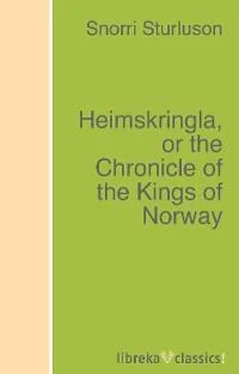Snorri Sturluson - Heimskringla, or the Chronicle of the Kings of Norway
Здесь есть возможность читать онлайн «Snorri Sturluson - Heimskringla, or the Chronicle of the Kings of Norway» — ознакомительный отрывок электронной книги совершенно бесплатно, а после прочтения отрывка купить полную версию. В некоторых случаях можно слушать аудио, скачать через торрент в формате fb2 и присутствует краткое содержание. Жанр: unrecognised, на английском языке. Описание произведения, (предисловие) а так же отзывы посетителей доступны на портале библиотеки ЛибКат.
- Название:Heimskringla, or the Chronicle of the Kings of Norway
- Автор:
- Жанр:
- Год:неизвестен
- ISBN:нет данных
- Рейтинг книги:3 / 5. Голосов: 1
-
Избранное:Добавить в избранное
- Отзывы:
-
Ваша оценка:
- 60
- 1
- 2
- 3
- 4
- 5
Heimskringla, or the Chronicle of the Kings of Norway: краткое содержание, описание и аннотация
Предлагаем к чтению аннотацию, описание, краткое содержание или предисловие (зависит от того, что написал сам автор книги «Heimskringla, or the Chronicle of the Kings of Norway»). Если вы не нашли необходимую информацию о книге — напишите в комментариях, мы постараемся отыскать её.
libreka classics – These are classics of literary history, reissued and made available to a wide audience.
Immerse yourself in well-known and popular titles!
Heimskringla, or the Chronicle of the Kings of Norway — читать онлайн ознакомительный отрывок
Ниже представлен текст книги, разбитый по страницам. Система сохранения места последней прочитанной страницы, позволяет с удобством читать онлайн бесплатно книгу «Heimskringla, or the Chronicle of the Kings of Norway», без необходимости каждый раз заново искать на чём Вы остановились. Поставьте закладку, и сможете в любой момент перейти на страницу, на которой закончили чтение.
Интервал:
Закладка:
20. DEATH OF SKOPTE.
One summer that Earl Hakon was on a cruise, there was a ship with him of which Thorleif Spake (the Wise) was steersman. In it was also Eirik, Earl Hakon's son, then about ten or eleven years old. Now in the evenings, as they came into harbour, Eirik would not allow any ship but his to lie nearest to the earl's. But when they came to the south, to More, they met Skopte the earl's brother-in-law, with a well-manned ship; and as they rowed towards the fleet, Skopte called out that Thorleif should move out of the harbour to make room for him, and should go to the roadstead. Eirik in haste took up the matter, and ordered Skopte to go himself to the roadstead. When Earl Hakon heard that his son thought himself too great to give place to Skopte, he called to them immediately that they should haul out from their berth, threatening them with chastisement if they did not. When Thorleif heard this, he ordered his men to slip their land-cable, and they did so; and Skopte laid his vessel next to the earl's as he used to do. When they came together, Skopte brought the earl all the news he had gathered, and the earl communicated to Skopte all the news he had heard; and Skopte was therefore called Tidindaskopte (the Newsman Skopte). The winter after (A.D. 973) Eirik was with his foster-father Thorleif, and early in spring he gathered a crew of followers, and Thorleif gave him a boat of fifteen benches of rowers, with ship furniture, tents, and ship provisions; and Eirik set out from the fjord, and southwards to More. Tidindaskopte happened also to be going with a fully manned boat of fifteen rowers' benches from one of his farms to another, and Eirik went against him to have a battle. Skopte was slain, but Eirik granted life to those of his men who were still on their legs. So says Eyjolf Dadaskald in the "Banda Lay":—
Eirik sailed along the land and came to Denmark, and went to King Harald Gormson, and staid with him all winter (A.D. 974). In spring the Danish king sent him north to Norway, and gave him an earldom, and the government of Vingulmark and Raumarike, on the same terms as the small scat-paying kings had formerly held these domains. So says Eyjolf Dadaskald:—
Eirik became afterwards a great chief.
21. OLAF TRYGVASON'S JOURNEY FROM RUSSIA.
All this time Olaf Trygvason was in Gardarike (Russia), and highly esteemed by King Valdemar, and beloved by the queen. King Valdemar made him chief over the men-at-arms whom he sent out to defend the land. So says Hallarsteid:—
Olaf had several battles, and was lucky as a leader of troops. He himself kept a great many men-at-arms at his own expense out of the pay the king gave him. Olaf was very generous to his men, and therefore very popular. But then it came to pass, what so often happens when a foreigner is raised to higher power and dignity than men of the country, that many envied him because he was so favoured by the king, and also not less so by the queen. They hinted to the king that he should take care not to make Olaf too powerful,—"for such a man may be dangerous to you, if he were to allow himself to be used for the purpose of doing you or your kingdom harm; for he is extremely expert in all exercises and feats, and very popular. We do not, indeed, know what it is he can have to talk of so often with the queen." It was then the custom among great monarchs that the queen should have half of the court attendants, and she supported them at her own expense out of the scat and revenue provided for her for that purpose. It was so also at the court of King Valdemar that the queen had an attendance as large as the king, and they vied with each other about the finest men, each wanting to have such in their own service. It so fell out that the king listened to such speeches, and became somewhat silent and blunt towards Olaf. When Olaf observed this, he told it to the queen; and also that he had a great desire to travel to the Northern land, where his family formerly had power and kingdoms, and where it was most likely he would advance himself. The queen wished him a prosperous journey, and said he would be found a brave man wherever he might be. Olaf then made ready, went on board, and set out to sea in the Baltic.
As he was coming from the east he made the island of Borgundarholm (Bornholm), where he landed and plundered. The country people hastened down to the strand, and gave him battle; but Olaf gained the victory, and a large booty.
22. OLAF TRYGVASON'S MARRIAGE.
While Olaf lay at Borgundarholm there came on bad weather, storm, and a heavy sea, so that his ships could not lie there; and he sailed southwards under Vindland, where they found a good harbour. They conducted themselves very peacefully, and remained some time. In Vindland there was then a king called Burizleif, who had three daughters,—Geira, Gunhild, and Astrid. The king's daughter Geira had the power and government in that part where Olaf and his people landed, and Dixen was the name of the man who most usually advised Queen Geira. Now when they heard that unknown people were came to the country, who were of distinguished appearance, and conducted themselves peaceably, Dixen repaired to them with a message from Queen Geira, inviting the strangers to take up their winter abode with her; for the summer was almost spent, and the weather was severe and stormy. Now when Dixen came to the place he soon saw that the leader was a distinguished man, both from family and personal appearance, and he told Olaf the queen's invitation with the most kindly message. Olaf willingly accepted the invitation, and went in harvest (A.D. 982) to Queen Geira. They liked each other exceedingly, and Olaf courted Queen Geira; and it was so settled that Olaf married her the same winter, and was ruler, along with Queen Geira, over her dominions. Halfred Vandredaskald tells of these matters in the lay he composed about King Olaf:—
23. EARL HAKON PAYS NO SCAT.
Earl Hakon ruled over Norway, and paid no scat; because the Danish king gave him all the scat revenue that belonged to the king in Norway, for the expense and trouble he had in defending the country against Gunhild's sons.
24. HARALD OPPOSES CHRISTIANITY.
The Emperor Otta (Otto) was at that time in the Saxon country, and sent a message to King Harald, the Danish king, that he must take on the true faith and be baptized, he and all his people whom he ruled; "otherwise," says the emperor, "we will march against him with an army." The Danish king ordered the land defence to be fitted out, Danavirke (1) (the Danish wall) to be well fortified, and his ships of war rigged out. He sent a message also to Earl Hakon in Norway to come to him early in spring, and with as many men as he could possibly raise. In spring (A.D. 975) Earl Hakon levied an army over the whole country which was very numerous, and with it he sailed to meet the Danish king. The king received him in the most honourable manner. Many other chiefs also joined the Danish king with their men, so that he had gathered a very large army.
25. OLAF TRYGVASON'S WAR EXPEDITION.
Olaf Trygvason had been all winter (A.D. 980) in Vindland, as before related, and went the same winter to the baronies in Vindland which had formerly been under Queen Geira, but had withdrawn themselves from obedience and payment of taxes. There Olaf made war, killed many people, burnt out others, took much property, and laid all of them under subjection to him, and then went back to his castle. Early in spring Olaf rigged out his ships and set off to sea. He sailed to Skane and made a landing. The people of the country assembled, and gave him battle; but King Olaf conquered, and made a great booty. He then sailed eastward to the island of Gotland, where he captured a merchant vessel belonging to the people of Jamtaland. They made a brave defence; but the end of it was that Olaf cleared the deck, killed many of the men, and took all the goods. He had a third battle in Gotland, in which he also gained the victory, and made a great booty. So says Halfred Vandredaskald:—
Читать дальшеИнтервал:
Закладка:
Похожие книги на «Heimskringla, or the Chronicle of the Kings of Norway»
Представляем Вашему вниманию похожие книги на «Heimskringla, or the Chronicle of the Kings of Norway» списком для выбора. Мы отобрали схожую по названию и смыслу литературу в надежде предоставить читателям больше вариантов отыскать новые, интересные, ещё непрочитанные произведения.
Обсуждение, отзывы о книге «Heimskringla, or the Chronicle of the Kings of Norway» и просто собственные мнения читателей. Оставьте ваши комментарии, напишите, что Вы думаете о произведении, его смысле или главных героях. Укажите что конкретно понравилось, а что нет, и почему Вы так считаете.












